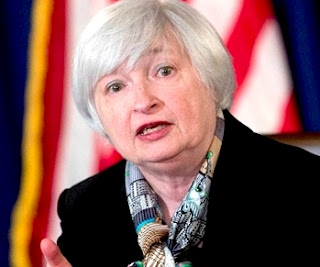 |
| Janet Yellen, Fed Chair |
Today's Fed Statement
Yellen today confirmed that the federal funds rate target range from 1-1.25 percent will remain unchanged once again, and that further reduction of the balance sheet will occur in October.
Under its asset sales plan, the Fed will be receiving monthly payments of up to $30 billion for its maturing Treasury securities, and $20 billion per month for its mortgage-backed securities, 12 months into the plan. A full transcript of Yellen's statement is here.
Under its asset sales plan, the Fed will be receiving monthly payments of up to $30 billion for its maturing Treasury securities, and $20 billion per month for its mortgage-backed securities, 12 months into the plan. A full transcript of Yellen's statement is here.
Yellen called this process of normalization necessary for the Fed, and timely. Inflation has been well below two percent this year. It is 1.6 percent now and is expected to rise to 1.9 percent next year. This increase should be accompanied by higher interest rates and a more stable economy. It does not impel the Fed to accelerate its planned series of rate hikes.
Labor Market
Labor market statistics of late offer reasons for optimism. Unemployment remains historically low and household incomes are rising. Additionally, labor force participation (employed/population) has clearly stabilized. Over the last three years, the range has been within 62.4 and 63.0 percent. The Obama years saw the labor market size stabilize, despite large and increasing numbers of Baby Boomers retiring. However, wages are barely moving.
Yellen admitted that analysts were unsure how to explain the sluggish core inflation rate, but pointed out that temporary inflation dampeners might be source of some of the lag. She defended the Fed’s rate-hike plan, arguing that, with little remaining slack in the labor market and the typical wage-price inflation lag, inflation is likely to increase next year.
Macroeconomic Policy Chops: Fed v. Congress
The GOP on the Hill has been unwilling for years to approve fiscal policy measures to combat the recession and stimulate the recovery. Recovery came to depend on the Fed to use its monetary policy authority creatively and aggressively – which it did to enormously beneficial effect. But when the economy was desperate for stimulus, the GOP leadership in Congress used debt brinksmanship to push through the rather contractionary 2011 Budget Control Act.
As yesterday’s reports of deficit-negative budget bills in the Senate might suggest, Republicans' austerity fever may have broken now, or for now, with visions of major tax cuts in the offing. But gone is the day when the Fed will take guidance from Congress or the President or compensate for policies badly designed for current economic conditions.
Succession Speculation
The President's views on monetary policy, the Fed, and his upcoming appointments to it will become much better known fairly soon. NEC Director Gary Cohn’s chance of being appointed Fed Chair after Yellen's term is up in four months has diminished. A new contender has emerged. Banker Kevin Warsh appears the most likely alternative to Yellen at present. Warsh was one of the youngest Federal Reserve Board Governors from 2006 to 2011. His views favoring broad financial deregulation clash with those of the Yellen Fed majority.
But Warsh has criticized low interest rates. The President, King of Debt, probably doesn't want it made too expensive. It is not beyond the pale that Janet Yellen may be reappointed Chair.
The President praised Yellen earlier this year for being “a low interest rate person.” It stands to reason that President Trump would favor her slow and measured approach to raising interest rates. That's one reason it's hard to predict his stance.
Fed Board – Trump Majority Forecast
With four central bank Governor vacancies out of seven seats to fill after Vice Chair Stanley Fischer’s announced retirement next month, Trump has the opportunity to shape monetary policy for years to come. A majority of Trump-appointed Federal Reserve Board is likely by early next year. Trump’s presumed preference is for accommodative policy. A howl from the bond vigilantes is likely if his nominees seem bent on economic growth.
We will find out in short order. Trump’s first nominee cleared the Senate Banking Committee two weeks ago and is headed for a floor vote. We await the appointment of three more nominees, along with Trump’s determination on the Chair and Vice-Chair positions. However, curiously, Yellen did mention during the press conference that the Board could function with only three Governors – three incumbents, that is.
See also Chasin Update 205 (Business Taxes) and 204 (Income Taxes)
See also Chasin Update 205 (Business Taxes) and 204 (Income Taxes)

No comments:
Post a Comment